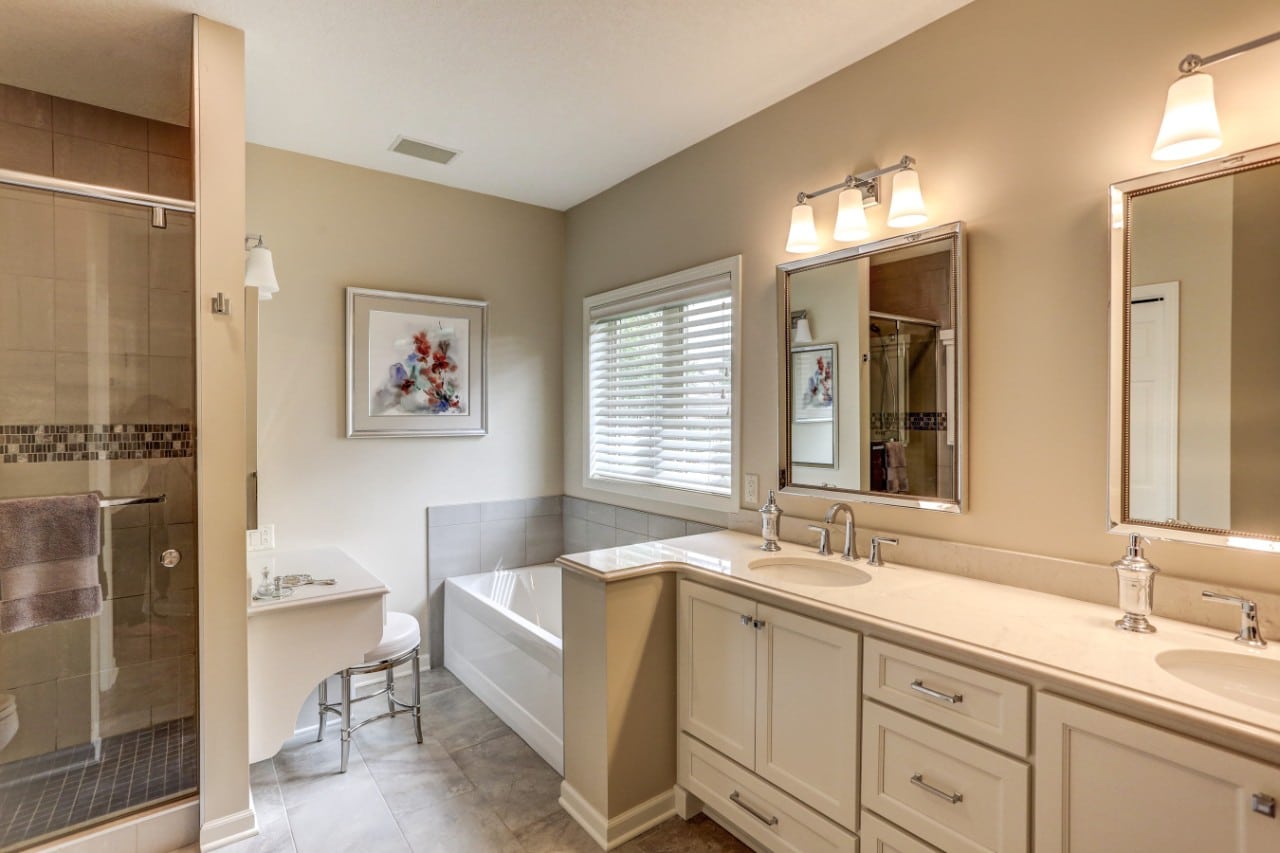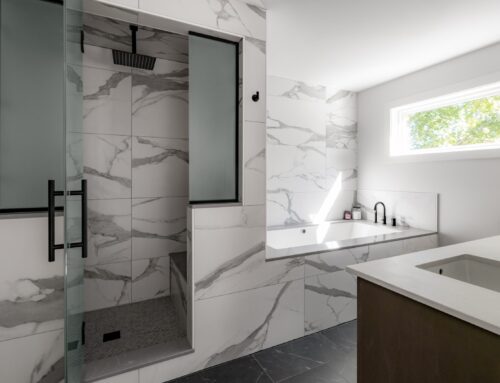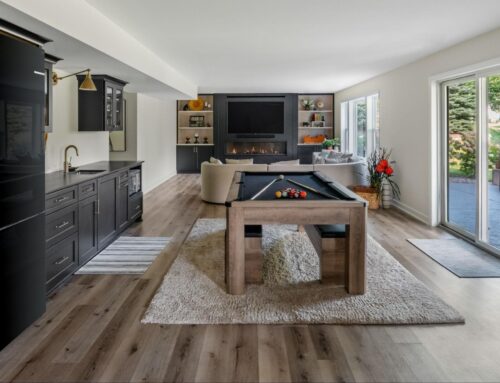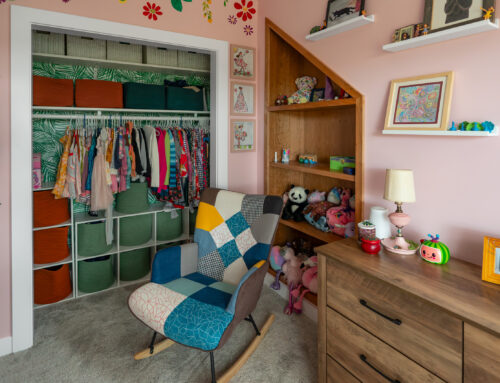Spending more time at home, we’ve all noticed which rooms feel especially cramped with everyone around. And few spaces get more daily use than the family bathroom. Between primping teenagers and kids jostling for elbow room during bedtime teeth brushing, it’s easy to feel frustrated as a big family sharing a small bathroom.
But how can you make your family bathroom more functional so everyone feels like they have enough space? Our lead interior designer Stephanie Morris shares her tips for how to design a bathroom that works for the whole family.
1. Customize Your Cabinetry
To increase floor space in a small family bathroom, choose a vanity that’s shallower than the standard depth. This gives more space to move throughout the bathroom without sacrificing much storage.
And more than just floor space, a shallow vanity helps with organization. The back half of bathroom vanities are difficult to access and easily become a mess of expired products and unused linens. Plus, a narrower countertop leaves less space for clutter to accumulate. And it can make it easier for little hands to reach the faucet.
If you have young children, you can also make the countertop more accessible with a built-in step stool. Try this DIY toe-kick vanity stool or have one built into a custom vanity. Either way, a built-in step stool is a game-changer for family bathrooms. Not only does it improve ergonomics and free up floor space, but you might prevent a stubbed toe in the middle of the night. Win-win.
2. Get Smart About Bathroom Storage
Storage is one of the top problems interior designer Stephanie Morris works to solve when talking with clients about their bathroom remodels. “We all want more storage,” she says, “but how do we get it?”. If you have space, Stephanie recommends a free-standing piece of furniture in place of a built-in. Not only does this give you a chance to show off your own personal style, but it’s an affordable way to customize your family bathroom organization.
There are so many options based on your space, style, and organizational needs.
- Maybe you like the thought of a vintage dresser for the extra drawer space and some extra surface area.
- Or, you might opt for a tall cabinet to store linens and toiletries on accessible shelving.
- A repurposed hutch can give the best of all worlds, with drawers, cabinets, and some display space.
If you prefer traditional bathroom cabinetry and built-ins, give them a simple upgrade with pull out drawer organizers. For Stephanie, these are a must-have. “When it comes to bathroom storage, it’s not just ‘Where am I going to put all my stuff?’” she says. “We want storage that’s easy to use and makes cleanup convenient.”
Bathroom drawer organizers can help because they not only increase the amount of usable storage, but they improve ergonomics. “They ensure that you don’t have to dig around,” Stephanie explains. “Everything is at your fingertips.”
They’re also a super affordable luxury. Basic pull out drawer organizers can be found at home improvement stores and require minimal DIY skills to install. Or take it a step farther with custom organizers. Tailored to your family’s needs, they’re designed to efficiently store everything from hair styling tools to laundry baskets.
Still short on cabinet space? Get creative. Use a large basket to store rolled towels or take advantage of space above the door with extra shelving for overflow items.
With a little imagination, you can increase your family bathroom storage and functionality. And you might even be able to convince the kiddos to keep it organized!
3. Divide and Conquer
When it comes to large family bathroom design ideas, breaking up the functionality of the space will likely create the most impact. While multiple kids can share a mirror and counter in the morning, other bathroom activities require more privacy. If you’ve got the space, consider creating a separate room for the toilet to make your bathroom more family-friendly.
This room, called a water closet, essentially creates a room within a room. This way, morning showers and tooth brushing aren’t interrupted by toilet needs.
A water closet doesn’t only make a bathroom more useable for big families. It’s also more sanitary. When a toilet flushes, water droplets containing germs fly through the air and land on nearby surfaces — countertops, hand towels, even toothbrushes.
By enclosing the toilet, you help minimize the spread of germs in your family bathroom and give everyone the space and privacy they need.
4. Make Room For Everyone
A double sink might feel like a master bathroom luxury, but adding a second sink can be a very practical addition to your family bathroom. A big family means lots of handwashing and teeth brushing, so give everyone the space they need — saving time and reducing stress during those busy morning routines.
Another consideration — especially for teenagers — is mirror space. Many people dislike their large, builder-grade plate mirror and want something more unique. But in a shared bath, the mirror is prime real estate. Instead of swapping it out for something smaller, Stephanie recommends giving it a simple upgrade with decorative casing. It’s a quick DIY and easily customizable. You can even paint the casing a fun color to give the space a kid-friendly pop of color.
5. Get the Kids Involved
Whether it’s cooking, cleaning, or updating your family bathroom, giving kids some ownership in the process is key. This doesn’t mean handing over the reins entirely, but offer your kids some options and ways to weigh in.
“Sometimes it’s getting the kids involved in the selections,” Stephanie explains. “Make it a family experience where they get to pick out a few details.” This could be cabinet hardware or a shower curtain. Select your top contenders for sconces or faucets and let them have the final say. Or, have them create artwork for the space and get it framed for a custom pop of color.
And definitely let the kids in on the organization process. The more they’re involved, the more likely they will put their things away in the long run. Give each kid their own drawer or bin and let them choose organizers to put things away independently. Not only are you making them feel involved in the process, but you’re building good habits for the years ahead.










